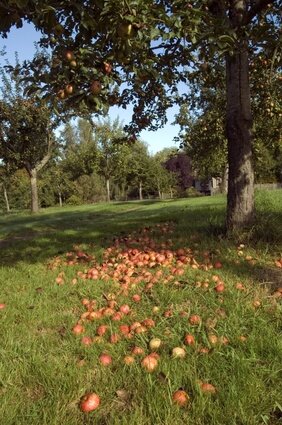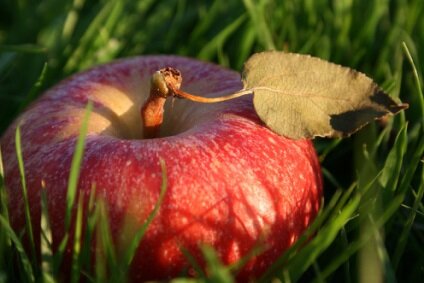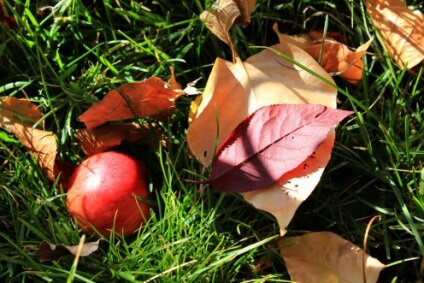Falling, As They Must

Say windfall and what’s likely to come to mind is some unexpected happening that brings good fortune. “Sudden money” perhaps. A jackpot. The scoring of a winning lottery ticket. It’s likely too, in these economic times when strapped households pinch pennies but corporations boast record profits, that windfall is viewed as what comes to those who skirt regulations, hire cheap labor, cleverly worm through generous loopholes.
But in autumn, hike an island path flanking the remnants of old rock boundary walls, tramp across a meadow increasingly encroached upon by stands of second growth spruce, or merely drive the roads that now course past what was once apparently an old farmstead with pruned orchards, and another kind of windfall becomes evident.
Fallen apples. The drops of trees no longer tended, fruit no longer harvested for pies or cider, for putting by jam. And of less interest to people toting buckets than to swarming yellow jackets and the island’s deer timidly venturing forth from the woods. Yes, these may be the sour, bring-on-the-tummy-ache apples but with names few of us know – like forgotten Kings and overlooked Mildens – just two of the 10,000 (!) varieties that, says Downeast Food Heritage Collaborative, grew in Maine in the mid 1800s. Mention apples and more readily tripping off our tongues are the handful of varieties familiar to us in supermarkets, some grown as much for unblemished transcontinental transport as for taste or crunch.

So hand-in-hand do windfall and early autumn clarities arrive, it’s as if these freely offered apples, true gifts of the season, are more like golden reliquaries – from which pours forth this scrubbed and almost touchable cidery light. These “rivers of windfall light” as Dylan Thomas celebrates in his poem “Fern Hill.”
And let’s not confuse windfall with blowdown, the word we use when the tree itself is uprooted, toppled over, when an entire swath of forest may be prostrated by a violent wind. “It’s an ill wind that blows nobody any good” proclaims an old nautical proverb. But no ill winds need be behind a windfall’s abundance. Nor, even, a breeze’s merest nudge.
Apples fall as they must. Out of the necessity of ripeness. Of a requisite, not quite done-ness when apples plunk into grass or onto path or roadway -- worm-eaten, possibly smashed, fermenting and abuzz, but no matter how blemished or misshapen, juicing the soil, sweetening the earth.

It’s fall. The season of leaves falling. Of temperatures falling. Of shortening days failing to hold onto as much light and for as long. Sure, it might be hard to overlook the negative connotations of fall – Eve and the apple, anyone? Or the way, when falling, we might break a hip or crack a rib. Or the way the forgotten thing or person too often falls through the cracks. Although who doesn’t hope, at least once in life, to fall truly, deeply, in love?
Maybe part of windfall’s aim is to connect its lucky and unlucky connotations, to link the unexpected gift with certainty. For it’s certain, right?, that the apple cannot return to its stem. That we can’t halt the advance of nights dipping toward frost. And we cannot contain, stopper the bottle on this here-then-not “windfall light”. Seasons march on. Another inevitability we cannot shake, like the certainty of our shared fate – “we all fall down” the final line reminder in, of all places, our toddlerhood’s sing-song classic.
Now, though, let’s celebrate warm autumn days still reluctant to let go of summer, not quite ready to tilt toward winter. Days of cherishing light and dropped apples in our path. Each of them a windfall.
A former version originally posted September 2011
